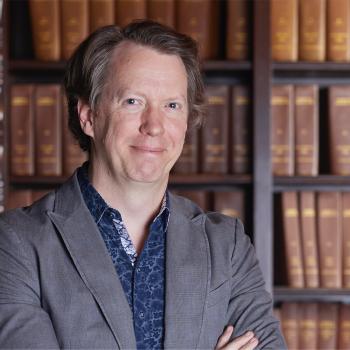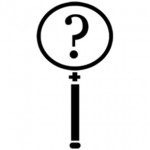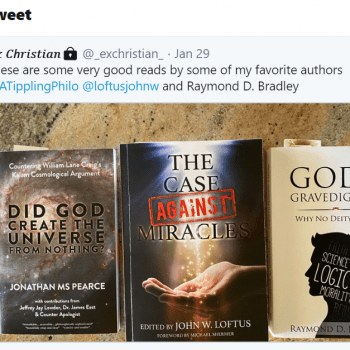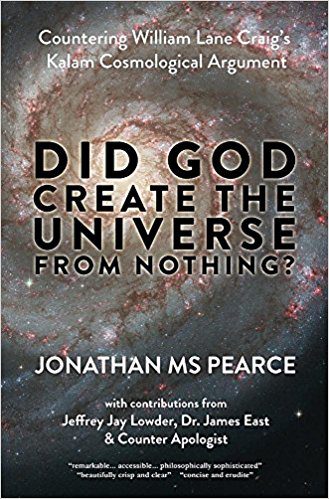Having posted the Philpapers survey results, the biggest ever survey of philosophers conducted in 2009, several readers were not aware of it (the reason for re-communicating it) and were unsure as to what some of the questions meant. I offered to do a series on them, so here it is – Philosophy 101 (Philpapers induced). I will go down the questions in order. I will explain the terms and the question, whilst also giving some context within the discipline of Philosophy of Religion.
This is the eleventh post, after
#1 – a priori
#2 – Abstract objects – Platonism or nominalism?
#3 – Aesthetic value: objective or subjective
#4 – Analytic-Synthetic Distinction
#5 – Epistemic justification: internalism or externalism?
#6 – External world: idealism, skepticism, or non-skeptical realism?
#7 – Free will: compatibilism, libertarianism, or no free will?
#8 – Belief in God: theism or atheism?
#9 – Knowledge claims: contextualism, relativism, or invariantism?
#10 – Philosophy 101 (philpapers induced) #10: Knowledge: Empiricism or Rationalism
The question for this post is: Laws of nature: Humean or non-Humean? Here are the results:
| Accept or lean toward: non-Humean |
532 / 931 (57.1%) |
| Accept or lean toward: Humean |
230 / 931 (24.7%) |
| Other |
169 / 931 (18.2%) |
We might start this piece by discussing what a law is. But let me warn you that this has a very close relationship to universals, abstracts, natural kinds, essentialism, nominalism and realism, as far as I am concerned – covered in previous pieces above and variously on this blog. This really is a whistlestop tour because this subject gets very dry and not very interesting very quickly…
David Hume
Hume, as an empiricist (see above), couldn’t see physical necessity in terms of human experience. Experience tells us how the world is, not how it must be as set out by prescriptive laws. You can see a connection here with ideas of induction. Any experiment we do, at best, finds out about regularities in the universe – how things regularly act.
Accidents
There are several different ideas to be brought up here: necessities, regularities and accidents. It might be that everyone in this room has brown hair; this is an accident and not a universal law or even a regularity as commonly understood.
We might have two statements:
- All gold spheres are less than a mile in diameter.
- All uranium spheres are less than a mile in diameter.
The first is an accident whilst the second is arguably a law because it is physically impossible, as far as we know. Certain laws are actually merely local generalisations: on Earth (i.e., in a particular context), such and such happens, to the point that we might think they are universal laws.
Regularity
The discussion on the ontological position of the laws of nature has been divided into three main parts in the general history of science: Regularity Theory, Nomic Necessitation, and Dispositional Essentialism. Regularity Theory dates back to David Hume, but its modern development is due to David Lewis (1973). The fundamental view in this account is that laws of nature do not possess any physical necessity. Every time I drop my pencil, it accelerates towards the centre of the Earth at a constant acceleration rate. The law here is Newton’s law of free fall (which is a special instance of Newton’s second law and the law of gravitation), and the free fall of the pencil every time I drop it is the instance of these laws. Rather than attributing any physical necessity to the relation between the law and its instance, Regularity Theorists claim that the law is the collection of all these instances, and nothing more than that. Since we do not attribute any kind of ontology to the law itself, rather than being the totality of instances, (in other words, we make the minimal claim about the ontological status of the law), Bird calls this view “Minimalism about Laws” (Bird, 1998, p. 27). [Source]
So the Humean approach is to call laws descriptive: they don’t prescribe how matter should act but describe how it acts by looking at regular behaviour and summing these up with a “law”. Personally, for what it’s worth, I favour this approach because it coheres better with my approach to ontology. This is more accurately called Regularity or a Regularist Theory. There is no assertion of necessity relation between the instances and the laws of nature.
One can say of Regularists (and think in terms of conceptual nominalism that I often espouse, where abstract ideas exist only in our minds) that there can be a limitless amount of laws, and differentiating between a generalisation and a law can be difficult as they are both descriptive.
As Jon Garvey states:
I had not previously realised, though, that this issue is represented by a deep divide amongst philosophers of science, the “Necessitarians” being opposed by a large body of “Regularists”, who more modestly restrict themselves to “laws of nature” as mere descriptions of the way the world is, without attempting to explain why it is thus by invoking necessity.
Necessitarian Theory
The Necessitarian Theory (Nomic Necessitation) is this prescriptive approach whereby matter “obeys” laws (this is also different, in some sense, to logically necessary) – see 1. below. Some even now argue that this non-Humean view was actually favoured by David Hume, that it is semi-Humean (based on a contingent view of the relation between things) but there you go. Somehow, the very substance of the universe inheres physical necessity, and the relationship between the laws and instances is an issue of universals. There is a subtle difference in two necessitarian views: that the laws are separate ontological entities that somehow enforce matter to obey them, or the physical necessity exists, say, in the electrons of the fundamental units of matter – see 2. below. As the IEP exemplifies:
- [E]lectrons will bear the electrical charge -1.6 x 10–19 Coulombs because there is a Law of Nature to that effect, and the universe conforms to, or is ‘governed’ by, this physically necessary (i.e. nomological) principle (along with a number of others, of course).
- [T]he statement “All electrons bear a charge of -1.6 x 10–19 Coulombs” is a Law of Nature because it correctly (veridically) describes a physical necessity in the world.[ 1 ]
The necessity, if you will, appears to reside in the matter – see below. It might be that there are only a few fundamental laws and that all other laws are consequences of these (this might lead to questioning the pragmatic meaning of “necessary”, which I do in “This World Is Philosophically Necessary“.
An example of a law that is not prescriptive might be Gresham’s Law, an economic generalisation:
[Gresham’s Law is] the theory holding that if two kinds of money in circulation have the same denominational value but different intrinsic values, the money with higher intrinsic value will be hoarded and eventually driven out of circulation by the money with lesser intrinsic value.
Dispositional Essentialism
Some people see this second version above as a further account – Dispositional Essentialism, a definite realist approach. This is where it gets a bit technical and relies on dispositions. (Many terms have been used to describe what we mean by dispositions: ‘power’ (Locke’s term), ‘dunamis’ (Aristotle’s term), ‘ability’, ‘potency’, ‘capability’, ‘tendency’, ‘potentiality’, ‘proclivity’, ‘capacity’, and so forth. In a very general sense, they mean disposition, or otherwise something close by. [Source]). A definition would be:
Dispositional essentialism is a form of scientific realism that has much to offer. The ‘sparse, fundamental’ properties are precisely those properties that participate in the (fundamental) laws of nature; but on the dispositional essentialist view, they do not only participate in laws. They ground those laws. Negative charge, for instance – if it is a fundamental property – is the disposition to repel other negative charges and attract positive ones; hence it is a law that negative charges attract other negative charges and attract positive ones. The same will hold, on the dispositional essentialist view, for other laws – at least the causal laws. Thus the laws discovered by such sciences as physics will not only be real, existing features of the world; they will be deeply rooted in the very fabric of the world.
Laws supervene on the dispositional essences of properties. Laws become metaphysically necessary because these essences of disposition are necessary in all possible worlds, and since laws depend on these, then laws are themselves necessary.
This has implications on ideas of free will (interestingly, I deny free will but prefer Regularity Theories).
Here, we start talking about essentialism with regard to natural kinds, causation, and with ramifications for abstracta and a number of other areas. Plenty to go and read about concerning these areas.
Truth and Necessitarianism
This, from the IEP, is worth thinking about:
Although there are problems aplenty in Tarski’s theory of truth (i.e. the semantic theory of truth, also called the “correspondence theory of truth”), it is the best theory we have. Its core concept is that statements (or propositions) are true if they describe the world the way it is, and they are false otherwise. Put metaphorically, we can say that truth flows to propositions from the way the world is. Propositions ‘take their truth’ from the world; they do not impose their truth on the world. If two days before an election, Tom says “Sylvia will win”, and two days after the election, Marcus says, “Sylvia won”, then whether these statements are true or false depends on whether or not Sylvia is elected. If she is, both statements are true; if she is not, then both statements are false. But the truth or falsity of those statements does not bring about her winning (or losing), or cause her to win (or lose), the election. Whether she wins or loses is up to the voters, not to certain statements.
Necessitarians – unwittingly perhaps – turn the semantic theory of truth on its head. Instead of having propositions taking their truth from the way the world is, they argue that certain propositions – namely the laws of nature – impose truth on the world.
The Tarskian truth-making relation is between events or state-of-affairs on the one hand and properties of abstract entities (propositions) on the other. As difficult as it may be to absorb such a concept, it is far more difficult to view a truth-making relationship the ‘other way round’. Necessitarianism requires that one imagine that a certain privileged class of propositions impose their truth on events and states of affairs. Not only is this monumental oddity of Necessitarianism hardly ever noticed, no one – so far as I know – has ever tried to offer a theory as to its nature.
Why is this important? More to think about.
Let me run through this as fast and parsimoniously as I can, including asking questions:
- Have necessitarians just replaced God as prescriber with the Laws of Nature?
- In this way, is there still a mysterian element to Necessitarian accounts? How does matter adhere to prescriptive rules? This, science cannot answer.
- “Physically impossible” is an idea that works with both accounts, though it may have subtle definitional differences; this is something that does not and will not happen and has not happened anywhere.
- A Regularist will differ in this way that saying something is physically impossible, like a perpetual motion machine, is not to say it is nomically impossible – there is a modal distinction here. The machine, a Nercessitarian would say, simply could not exist.
- People have been pragmatically explaining things in terms of regularity without recourse to nomic necessity for thousands of years, thank you very much.
- With a Necessitarian view, free will is a problem as fundamental laws prescribe how everything works in the universe. There is no room, it appears, for contra-causal free will. Regularity, on the other hand, dissolves the problem. You can’t “violate” a law of nature, in a sense; you do what you do and describe this accordingly. In an extreme sense, there could be a “law” qua contextual description of what you do at any given time: brushing your teeth at point t15493, or not brushing your teeth. You could argue that an agent can “choose” their laws of nature – I wouldn’t and would take issue with the language used here.
- To wit, as the IEP states: “To make the claim even more pointedly: it is only because Necessitarianism tacitly adopts an anti-semantic theory of truth that the supposed problem of free will vs. determinism even arises. Adopt a thoroughgoing Regularist theory and the problem evaporates.”
- A Regularist might say that all laws of physics and chemistry are no different than the laws of economics, say, Gresham’s Law above. It might depend on what level you are focusing the microscope.
- Many Regularist “laws” are generalisations, or statistical in nature. Can more fundamental, “real” laws be statistical as well, such as the half-life of certain elements?
- Necessitarians tend to struggle with such statistical approaches: how can something decay at this rate 50% of the time under strict laws? Enter stage right fun discussions of “stochastic nomicity”. This idea actually underwrites an important area of philosophy of science.
- For Regularists, the way the universe is is ultimately inexplicable.
- For Necessitarians, the fact that trillions upon trillions of electrons act in a particular and regular manner must be accounted for by some law of nature, not some “coincidence”, so to speak.
- Regularists will reply with a kind of “so what?” as this is unempirical and not very useful. The way-the-world-is is good enough for them; for Necessitarians, explanations must include ideas of the way-the-world-must-be.
As deeply philosophical as this divide is, there won’t be any solution going forward, most notably because accessing the unempirical and abstract world of Necessitarian laws and their causal relations with matter is arguably entirely metaphysical.
And there you go, long, but hopefully not too long that it is unwieldy.
Stay in touch! Like A Tippling Philosopher on Facebook:


























Religious vs Nonreligious blogs: Freedom of Speech and Allowing Challenge
I have a very lax approach to banning and censorship here, as well you know. And you may or may not like this as threads do, indeed, get filled up with comments from those we disagree with. Sometimes, I get asked to ban so-and-so, and there can be merit in banning the more trollish ones, but it also comes down to what the definition of a troll is and who gets to arbitrate the definition and qualification.
Sometimes the reaction to certain comments is, “Well, your opinion is sooo antithetical to mine that I find it (morally) reprehensible, and therefore you should be banned.” Quite often, it comes down to axioms: whatever you put into the function machine will determine the outcome. But we shouldn’t just ban people, I believe, because their views are merely antithetical to our own. We should be able to point the issues out, correct them, or at least allow them to hoist by their own petard.
However, the issue is that people generally don’t change their minds but instead tend to entrench in their original positions by employing large dollops of cognitive dissonance. This can mean huge frustration as we seemingly provide ample good reason and counter-arguments, but to no avail. Because positions are so often arrived at psychologically and not rationally.
I can confidently say the following (but please do not confuse it with arrogance): I have never knowingly run away from a difficult conversation, thread or comment that I cannot resolve in my head. I may run out of time, forget about them, or get sidetracked. But there really is no area of philosophy (everything) that presents problems of coherence for any of my beliefs. I am completely honest with myself, and hopefully with my readers. I couldn’t sleep at night knowing that some cornerstone of my entire matrix of beliefs and philosophy was incredibly weak or fraught with issue.
I believe that ost divergence in beliefs actually boils down to ontology. You will find that most people who disagree with me on morality, politics (i.e., morality), God, religion and so on can actually have their disagreement mapped back to ontology. I have written before how conceptual nominalism vs (Platonic) realism is essentially the primary debate, and everything else follows. These are the axiomatic building blocks we feed into our function machines that produce wildly different outcomes. Just refer back to those massive threads here about the Second Amendment and the gun nuts who came here to defend their right to carry and use guns. They, to a man, failed to understand that the thrust of the articles was about ontology – what rights are made of. They happily asserted the conclusion – that natural rights exist – but utterly failed to show that/how such rights exist.
I am really comfortable with my beliefs; they are on solid ground because I build from the bottom up. So many religious people build from the top down.
I have found that, when it comes to commenting, atheists and freethinkers really are more freethinking. As bloggers, we are far more likely to have open threads, less moderation and a willingness to deal with naysayers. We kinda live for it.
On the other hand, and I have been personally on the end of many examples of this, Christian/religious bloggers hardly ever allow open and frank comments and conversations that challenge their cherished views.
I simple terms: the higher your religiosity is, the more blinkered you seem to be. And, basically, religious bloggers are far less open to challenge and freethinking than nonreligious ones. I can tell you this from a Patheos viewpoint: the whole Disqus filter issue was one that was broadly not an issue for the countless religious bloggers here at Patheos because so many either didn’t allow comments at all, or heavily moderated them anyway. It was all the nonreligious bloggers who kicked up a right stink. It was boards like mine that were most affected. Because boards like mine really do allow free speech. Right-wing, often religious types complain so often about centralised authoritarian behaviour from the left, but they are so often the most guilty. Yes, there are exceptions on both sides, but the averages are clear to see.
I would be interested to hear people’s experiences of religious vs nonreligious comment forums and blogs. Do you agree?
Stay in touch! Like A Tippling Philosopher on Facebook:
You can also buy me a cuppa. Please… It justifies me continuing to do this!